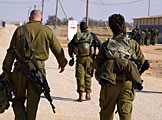Ilankai Tamil Sangam30th Year on the Web Association of Tamils of Sri Lanka in the USA |
|||||
 Home Home Archives Archives |
Enforcing the Laws of WarModern day challenges to the Geneva ConventionsSeminar, Nov. 16-19, 2010, Salzburg, Austria
Speakers: Jonathan Benthall - Member and former Director of the Royal Anthropological Institute, London and Associate Fellow, Humanitarian and Conflict Response Institute, University of Manchester Christopher Coker - Professor of International Relations, London School of Economics and Political Science Mark Ellis - Executive Director, International Bar Association, London Otto Triffterer - Professor of Austrian and International Criminal Law, University of Salzburg John Bellinger, III - Partner, Arnold & Porter, LLP, Washington, DC and former Legal Adviser to the United States Secretary of State (invited) Abstract: Now 60 years old, the four Geneva Conventions and their two Additional Protocols have been ratified by more countries than are members of the United Nations. But they are also being ever more severely tested. Modern warfare and efforts to combat terrorism have sparked debates on such issues as the definition of armed conflict; the qualification of individuals as "unlawful combatants", "terrorists", or "participating civilians"; and what degree of force can be considered "proportional" in highly asymmetric conflicts - to name but a few. These challenges have contributed to a widespread and apparently growing lack of respect for international humanitarian law, and pose acute problems both to traditional bodies seeking to interpret and apply that law (such as the International Committee of the Red Cross) and to new ones seeking to enforce it (such as the International Criminal Court). This session will examine the legal profession's application of international humanitarian law, politicians' willingness to support its enforcement, and military practitioners' efforts to uphold its principles in the field. How can each of these sectors serve and strengthen the others in their common goal of protecting civilians? What role can each of these groups play as they interact with parties to conflict, whether these are State or non-State actors? And how might violence against civilians be better prevented in advance as well as punished after the fact?
Fee & Logistical Information: The fee, which includes all accommodation and meals during the event as well as the program's academic and social content, is 535 Euros for a single room or 870 Euros for a double. Travel is not included in the price. The program will begin in the afternoon of the 16th at approximately 16:00 and conclude on the 19th after breakfast. This event will be held in Salzburg at Schloss Leopoldskron. For additional details on registration, please download the following registration form. The registration form and any questions related to the event may be directed to Ian Brown, Manager of the Salzburg Global Fellowship (ibrown(at)SalzburgGlobal.org). |
||||
|
|||||


